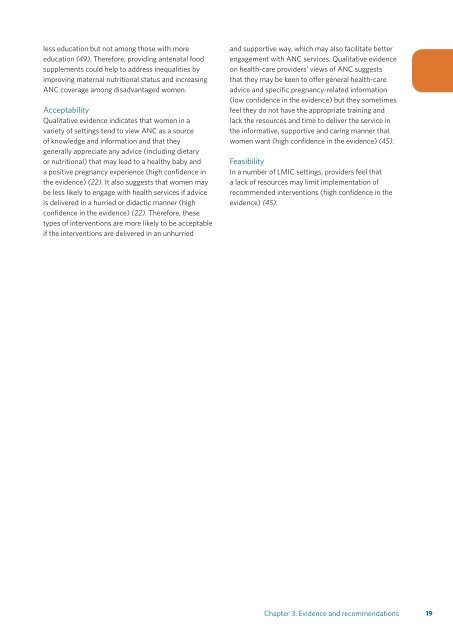WHO recommendations on antenatal care for a positive pregnancy experience
5pAUd5Zhw
5pAUd5Zhw
You also want an ePaper? Increase the reach of your titles
YUMPU automatically turns print PDFs into web optimized ePapers that Google loves.
less educati<strong>on</strong> but not am<strong>on</strong>g those with more<br />
educati<strong>on</strong> (49). There<strong>for</strong>e, providing <strong>antenatal</strong> food<br />
supplements could help to address inequalities by<br />
improving maternal nutriti<strong>on</strong>al status and increasing<br />
ANC coverage am<strong>on</strong>g disadvantaged women.<br />
Acceptability<br />
Qualitative evidence indicates that women in a<br />
variety of settings tend to view ANC as a source<br />
of knowledge and in<strong>for</strong>mati<strong>on</strong> and that they<br />
generally appreciate any advice (including dietary<br />
or nutriti<strong>on</strong>al) that may lead to a healthy baby and<br />
a <strong>positive</strong> <strong>pregnancy</strong> <strong>experience</strong> (high c<strong>on</strong>fidence in<br />
the evidence) (22). It also suggests that women may<br />
be less likely to engage with health services if advice<br />
is delivered in a hurried or didactic manner (high<br />
c<strong>on</strong>fidence in the evidence) (22). There<strong>for</strong>e, these<br />
types of interventi<strong>on</strong>s are more likely to be acceptable<br />
if the interventi<strong>on</strong>s are delivered in an unhurried<br />
and supportive way, which may also facilitate better<br />
engagement with ANC services. Qualitative evidence<br />
<strong>on</strong> health-<strong>care</strong> providers’ views of ANC suggests<br />
that they may be keen to offer general health-<strong>care</strong><br />
advice and specific <strong>pregnancy</strong>-related in<strong>for</strong>mati<strong>on</strong><br />
(low c<strong>on</strong>fidence in the evidence) but they sometimes<br />
feel they do not have the appropriate training and<br />
lack the resources and time to deliver the service in<br />
the in<strong>for</strong>mative, supportive and caring manner that<br />
women want (high c<strong>on</strong>fidence in the evidence) (45).<br />
Feasibility<br />
In a number of LMIC settings, providers feel that<br />
a lack of resources may limit implementati<strong>on</strong> of<br />
recommended interventi<strong>on</strong>s (high c<strong>on</strong>fidence in the<br />
evidence) (45).<br />
Chapter 3. Evidence and <str<strong>on</strong>g>recommendati<strong>on</strong>s</str<strong>on</strong>g> 19


